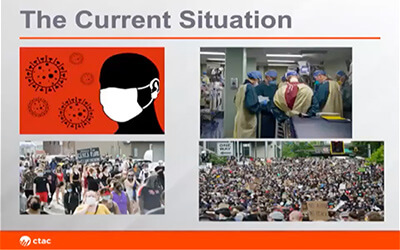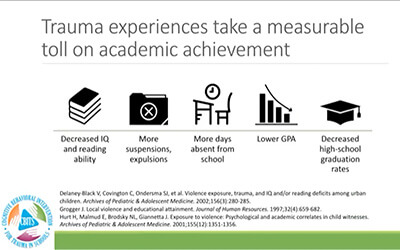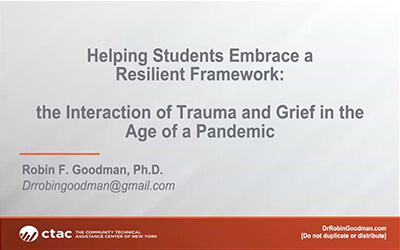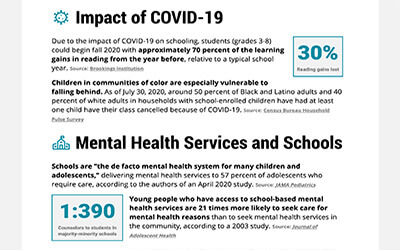Below are resources focused on supporting child mental well-being, especially in response to the COVID-19 pandemic and the “new normal” in which many young people will attend school in the Fall. These back-to-school tools and trainings were created by the McSilver-led Community Technical Assistance Center of New York (CTAC) for caregivers, educators, and mental health service providers, but they may also be beneficial to parents and anyone working with children. Some resources may require one-time, free registration to access.
 Helping Children Adjust to the New Normal, Part 1: Integrating Trauma-Informed and Resilience Building Practices as Students Return to School
Helping Children Adjust to the New Normal, Part 1: Integrating Trauma-Informed and Resilience Building Practices as Students Return to School
The global pandemic and racial unrest in our communities represent major stressors that can affect student learning and mental health and schools must be prepared to meet the social-emotional needs of students returning to school. Uncertainty and concerns about safety after a long hiatus from normal school routines will likely be high for all children and youth, and many students may also be returning from more severe exposure to major adversity. In this webinar, we review a working model for a 3-tiered trauma-informed approach to help schools prepare for the return of children and youth to schools.
 Helping Children Adjust to the New Normal, Part 2: Implementing Evidence-Based Interventions for Students Returning to School with Mental Health Difficulties
Helping Children Adjust to the New Normal, Part 2: Implementing Evidence-Based Interventions for Students Returning to School with Mental Health Difficulties
A trauma sensitive school implements evidence-based interventions to address the needs of students who might be demonstrating social, emotional and behavioral challenges as a result of their exposure to trauma or chronic stress. As students return to school in the COVID-19 era, many may have mental health problems related directly to the health crisis or other crises in these times, such as the economic crisis and systemic racism. The focus of the webinar is on ways to identify students who may need more intensive intervention and flexibly implement Cognitive Behavioral Intervention for Trauma in Schools (CBITS), an evidence-based intervention to address the needs of students experiencing significant mental health difficulties resulting from exposure to highly stressful or traumatic events.
 Helping Students Embrace a Resilient Framework: The Interaction of Trauma and Grief in the Age of the COVID-19 Pandemic
Helping Students Embrace a Resilient Framework: The Interaction of Trauma and Grief in the Age of the COVID-19 Pandemic
As students return to school in the COVID-19 era, some may return having experienced the death of a loved one — a parent, family member, friend, member of the school community — from the illness. Students can have a range of grief reactions as a result of the many unique circumstances brought about by the pandemic, and understanding the interaction of grief and trauma is helpful for identifying students needing different levels of support. This webinar outlines risk and protective factors that help predict those students with greater needs, methods for assessing reactions, and strategies for addressing students’ grief. The webinar provides suggestions for strategies that can be implemented in schools, yet the approaches to assessment and intervention can be implemented in a variety of community- and clinic-based settings.
 COVID-19, Mental Health and Students: Data and Resources
COVID-19, Mental Health and Students: Data and Resources
The mental health needs of students must be addressed amid the COVID-19 pandemic, major disruptions to the way they attend school, economic upheaval and a national reckoning around racial injustice, with students of color being especially vulnerable. The McSilver Institute has compiled the following data and resources relating to the challenges for Black, Latinx and other youth of color.
 Helping Children Adjust to the New Normal, Part 1: Integrating Trauma-Informed and Resilience Building Practices as Students Return to School
Helping Children Adjust to the New Normal, Part 1: Integrating Trauma-Informed and Resilience Building Practices as Students Return to School Helping Children Adjust to the New Normal, Part 2: Implementing Evidence-Based Interventions for Students Returning to School with Mental Health Difficulties
Helping Children Adjust to the New Normal, Part 2: Implementing Evidence-Based Interventions for Students Returning to School with Mental Health Difficulties Helping Students Embrace a Resilient Framework: The Interaction of Trauma and Grief in the Age of the COVID-19 Pandemic
Helping Students Embrace a Resilient Framework: The Interaction of Trauma and Grief in the Age of the COVID-19 Pandemic COVID-19, Mental Health and Students: Data and Resources
COVID-19, Mental Health and Students: Data and Resources